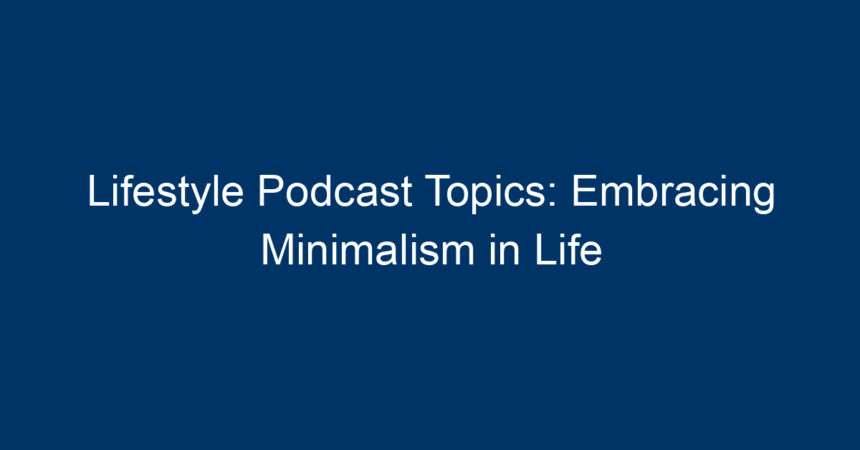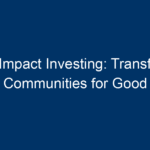In an age of constant distraction and overwhelming choices, embracing minimalism has emerged as a refreshing and liberating lifestyle. Minimalism isn’t merely about decluttering physical spaces; it’s a mindset that encourages simplicity and intentional living. For podcasters, exploring lifestyle podcast topics like minimalism can attract a diverse audience eager to simplify their lives. Whether you’re a seasoned podcaster or looking to launch your first show, this article dives deep into how minimalism can enrich both your life and your podcast content.
What is Minimalism?
A Philosophy of Less
At its core, minimalism is about stripping away the unnecessary to focus on what truly matters. It champions quality over quantity, encouraging individuals to analyze their possessions, commitments, and even their thoughts. The ultimate goal? To find freedom from the excess that often weighs us down.
Benefits of a Minimalist Lifestyle
-
Reduced Stress: A cluttered environment can lead to a cluttered mind. Embracing a minimalist approach can create a more serene living space and a calmer mental state.
-
Enhanced Focus: With fewer distractions, minimalists often find it easier to concentrate on tasks and achieve their goals.
-
Financial Freedom: By prioritizing experiences over material possessions, many minimalists save money and spend wisely.
- Environmental Impact: Minimalism aligns with sustainability, encouraging responsible consumption and a lower ecological footprint.
Lifestyle Podcast Topics: Minimalism in Practice
The Foundation of Minimalism
When discussing minimalism on your podcast, you could start with its historical context. Trace its roots from ancient philosophies, such as Stoicism and Zen Buddhism, which valued simplicity and intentional living. This foundation provides listeners with a backdrop for understanding why minimalism resonates today.
Decluttering Your Physical Space
A popular lifestyle podcast topic is the process of decluttering. Invite guests who are experts in this field, such as professional organizers or authors, to share tips and personal experiences.
Decluttering Techniques
-
The KonMari Method: Marie Kondo’s approach focuses on keeping only items that "spark joy." Discuss how this method has transformed lives and homes.
- The 30-Day Minimalism Game: Challenge listeners to declutter one item on the first day, two on the second, and so on, culminating in 30 items on the last day.
Minimalism and Mental Health
Explore how minimalism impacts mental well-being. Invite psychologists or life coaches to discuss the mental clarity gained through simplified living. Topics can include:
-
Mindfulness: How practicing mindfulness complements a minimalist lifestyle.
- Digital Minimalism: Encouraging listeners to disengage from social media and excessive screen time—removing mental clutter.
Embracing Minimalism in Different Aspects of Life
Minimalism in Home and Design
Discuss how minimalist design can create harmonious living spaces. Feature interior designers who specialize in minimalist aesthetics and offer actionable tips for listeners to create their own serene environments. Consider the following:
-
Color Schemes: Talk about the importance of neutral colors and simple furniture.
- Functional Decor: Emphasize decor items that serve dual purposes.
Minimalism in Relationships
Relationships can also benefit from a minimalist mindset. Encourage discussions around:
-
Quality Over Quantity: How prioritizing meaningful friendships enriches life.
- Healthy Boundaries: Teach listeners to evaluate their commitments and say no to unnecessary obligations.
Minimalism in Consumption
Your podcast can delve into mindful consumption. Engage listeners by discussing:
-
Sustainable Fashion: The rise of capsule wardrobes and ethical brands.
- Food Choices: How minimalism can inspire simpler, healthier meals that focus on whole ingredients.
Overcoming Challenges in a Minimalist Journey
Common Misconceptions
Address frequent myths about minimalism, such as:
-
“Minimalism is Boring”: Debunk this by showcasing how minimalism can lead to more adventurous and fulfilling experiences.
- “You Can’t Have Anything”: Emphasize that minimalism is about making conscious choices, not deprivation.
Real-Life Experiences
Share stories from those on their minimalist journeys. These real-life accounts can resonate with listeners, providing them with relatable experiences and inspiring them to embark on their own journeys.
Actionable Insights for Your Audience
Create a Minimalist Plan
Encourage your listeners to create their own minimalist plans. Here’s a simple guide they can follow:
-
Set Clear Goals: Determine what areas of their lives need decluttering—be it physical items, digital space, or relationships.
-
Start Small: Begin with one room or a specific area and expand from there.
- Reflect Regularly: Create time for personal reflection to reassess needs and desires.
Develop a Minimalist Mindset
Fostering a minimalist mindset is crucial for long-term success. Suggest practices such as:
-
Journaling: Encourage listeners to jot down thoughts and feelings about their possessions and lifestyle choices.
- Mindful Shopping: Teach them to ask, “Do I need this?” before making a purchase.
Conclusion
Embracing minimalism is a powerful way to simplify life, bringing clarity and peace of mind in a chaotic world. For podcasters eager to explore engaging lifestyle podcast topics, the journey into minimalism offers countless avenues for discussion. From decluttering and mental health to sustainable choices and relationship dynamics, the minimalist lifestyle provides rich content that resonates with a broad audience.
As you plan your episodes, remember to integrate personal stories, expert insights, and actionable advice. The goal is to create a community where listeners can share their experiences and inspire each other on this liberating journey. By embracing minimalism not only in your podcast menu but also in your own life, you’ll not only enrich your content but also empower your audience to live intentionally. In the end, minimalism isn’t just about living with less—it’s about living more.




